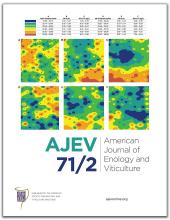Abstract
Simultaneous inoculation of yeast and lactic acid bacteria (LAB) is considered a state-of-the-art strategy to reduce overall vinification time and improve microbiological stability of wines. This inoculation protocol sparked interest in selecting yeast and LAB strains to modulate malic acid consumption rate and wine composition. The study presented here addresses the impact on malic acid consumption and metabolite production of combining Saccharomyces cerevisiae strains with different fermentation rates and nutrition demands with Lactobacillus plantarum and Oenococcus oeni strains. S. cerevisiae strains in pure culture fermentations without LAB inoculation exhibited different patterns of malic acid consumption rate and metabolite production. Simultaneous S. cerevisiae and LAB inoculation influenced the kinetics of lactic acid production and titratable acidity in a LAB-strain dependent manner. Wines undergoing malolactic fermentation with L. plantarum ML Prime finished faster and contained more L-lactic acid than similar wines inoculated with O. oeni Lalvin VP41; however, the degree of acidification depended on the S. cerevisiae strain used to conduct alcoholic fermentation. This study reveals new knowledge about the use of L. plantarum in winemaking and shows the effect of S. cerevisiae strains with different enological characteristics, with or without LAB co-inoculation, on wine composition.
- color
- interactions
- Lactobacillus plantarum
- malolactic fermentation
- Oenococcus oeni
- Saccharomyces cerevisiae
- Received August 2019.
- Revision received October 2019.
- Revision received November 2019.
- Accepted December 2019.
- Published online April 2020
- © 2020 by the American Society for Enology and Viticulture
Sign in for ASEV members
ASEV Members, please sign in at ASEV to access the journal online.
Sign in for Institutional and Non-member Subscribers
Log in using your username and password
Pay Per Article - You may access this article (from the computer you are currently using) for 2 day for US$10.00
Regain Access - You can regain access to a recent Pay per Article purchase if your access period has not yet expired.










